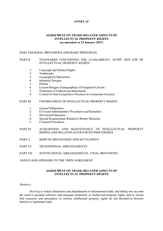Agreement on Trade-Related Aspects of Intellectual Property Rights (TRIPS)
The Agreement on Trade-Related Aspects of Intellectual Property Rights (TRIPS) is one of three core treaties managed by the World Trade Organization (WTO). TRIPS obligates countries to establish and enforce a minimum level of protection for intellectual property (IP) rights. It also provides a framework for dispute mediation and implementation of national IP regulations in developing countries. The Doha Declaration, adopted by the WTO in 2001, reaffirmed that the TRIPS agreement should be interpreted and implemented in a manner that promoted equitable access to medicines for the protection of public health. TRIPS has played a key role in debates over intellectual property related to pharmaceutical technologies.
WTO Members’ national IP regimes must meet the minimum standards set by the TRIPS Agreement. Domestic patent legislation is available by country on the trade and intellectual property page.
| Opened for signature | 6 Dec 2005 |
| Entered into force | 23 Jan 2017 |
| Latest update | 23 Jan 2017 |
| Available languages |
Related treaties
Related topic
States parties
All World Trade Organization (WTO) member states are automatically party to TRIPS and were given a grace period of one year to comply with the treaty after it entered into force on 1 January 1995. The date that each country ratified the Marrakesh Agreement (and thus joined the WTO) is available on the World Trade Organization page.
On 5 December 2005, WTO members approved amendments to the TRIPS agreement to formalize and make permanent the provisions on patents and public health. The table below shows WTO member status and whether or not members have accepted the amendment to TRIPS, which opened for acceptance on 1 December 2007. WTO members have until 31 December 2023 to accept the amendment.
Country | Status | Signed | Ratified | Entered into force |
|---|---|---|---|---|
| Afghanistan | Party | |||
| Albania | Party | 28 Jan 2009 | 23 Jan 2017 | |
| Algeria | Observer | |||
| Andorra | Observer | |||
| Angola | Party | |||
| Antigua and Barbuda | Party | 12 May 2021 | 12 May 2021 | |
| Argentina | Party | 20 Oct 2011 | 23 Jan 2017 | |
| Armenia | Party | |||
| Australia | Party | 12 Sep 2007 | 23 Jan 2017 | |
| Austria | Party |
Party
The state has accepted, approved, ratified, or is otherwise party to the agreement, indicating consent to be bound to the agreement.
Signatory
The state has signed, but not yet ratified or become an official party to the agreement. Where the signature is subject to ratification, acceptance or approval, the signature does not establish the consent to be bound. However, it is a means of authentication and expresses the willingness of the signatory state to continue the treaty-making process. The signature qualifies the signatory state to proceed to ratification, acceptance or approval. It also creates an obligation to refrain, in good faith, from acts that would defeat the object and the purpose of the agreement.
Non-party
The state has not taken any actions with regard to the agreement.
Associate member
The state may have requirements for some of the statutory or non statutory aspects of an agreement, but would not confer all of the obligations of the agreement on the member. Associate members may not have voting rights.
Observer
The state is non-party to an agreement, but has the ability to attend meetings or other discussions, and otherwise participate in activities. Observers may be granted permission to speak at formal meetings.




